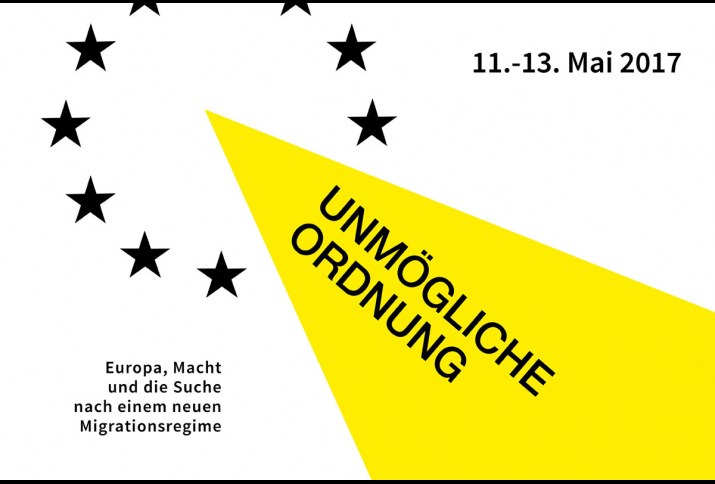Power of movements was the intriguing and stimulating topic of Panel V. Through a productive series of three presentations and an engaged follow-up discussion, the participants emphasized the reasons and factors behind the rising racist and anti-migratory populist movement, particularly as they came apparent during the French presidential election campaign 2017 and the Brexit vote. Through the friction between these and Eckert’s account of the German solidarity movement Wir Machen Das, an insight was offered on the importance of popular movements on all sides of the migration story.
Panel V: Power of Movements was chaired by Isabella Löhr from GWZO Leipzig and featured James Wolfreys from King’s College, Brendan McGeever from Birkbeck College at the University of London and Julia Eckert from “Wir Machen Das” as speakers. This particular panel, along with an engaging follow-up discussion, examined the power of both a populist movement, specific to French presidential elections and Brexit vote, and a universal solidarity movement which may render a new “Order” possible.
James Wolfreys, in the presentation of his paper “The Rise of the Far Right, Migration, Europe, and Racism in France”, explained the background of Marine Le Pen’s surprising success in the first round of last French presidential elections. The origin of the National Front's rise dates back to 1980s when the movement was formed as a radical right reaction against unemployment and inequality figures under the the Socialist Party. It remained a marginal party until 2002, the year of “War against (Islamic) Terror”. As Wolfreys demonstrated, the radical right benefited from a Republican shift toward the right's reasoning and vocabulary. This drift played a significant role in the reshaping of French national identity, mainly revolving around such issues as racism, islamophobia and xenophobia. This lead to the emergence of a tendency to reduce the Republican secular tradition to topics of migration and culture which ultimately fed radical currents. This reshaped the delegitmized openly racist biological discourse of the past colonial centuries to a political discourse centering around culturalistic rhetoric. This created a conflict between the Republican model of integration and multicultural reality and, supported by recent developments in European politics, has led to the legitimization and capitalization of French chauvinism and anti-migratory racism by the far-right. Therefore, the Republican secular tradition as an attempt to evoke the memory of the old French colonization through the feeding of xenophobia gave the way for Le Pen’s success, which countered the resurgence of anti-racist movement in the Parliament.
As Brendan McGeever lucidly demonstrated in his paper “Preparing Brexit: Racism, Class, Empire”, a very similar story happened place in Britain. The rise of reactionary populism in Europe against the neoliberal establishment since 1990s constituted a globally historical moment. The particular example of Brexit, in which the question of class, race, and empire were often utilized to boost the campaigns of Boris Johnson and Nigel Farage, displays the connection between nationalist agendas and new versions of isolationist racism. This British populism is, as McGeever demonstrated, an aftereffect of the decline of British economy and the defeat of the labor movements under Margaret Thatcher. Furthermore, the social decline of the so-called 'white' working class due to globalization led to the recent 'white' self-victimization and the turn toward racial instead of social politics. Therefore, immigration has been radically politicized through skepticism and fear. Attempts such as May’s “truly global Britain” speech try to revoke the ancient pride of now the lost empire and combines this sentiment with collective concerns about economic and social security. Such arguments created the language that lead to the island retreat and seem to accompany the language of politics in Britain and its process of exiting from Europe. As McGeever pointed out at the end, “we are at five minutes to midnight” and the question remains what will happen when the clock of the Empire 2.0 strikes twelve.
As a contrast to the first two speakers, Julia Eckert from “Wir Machen Das” shared a more optimistic narrative in her talk “From Charity To Solidarity”. Eckert argued that, while the new populist tide must not be ignored, many people are working in the opposite direction. As a part of Wir Machen Das, she witnessed firsthand how after the summer of 2015 not only hate but also activism exploded (currently, an estimated 6 million people in Germany are active in pro-migrant initiatives). And not only are these initiatives existent, they have started to turn from apolitical charity into a highly political solidarity focused movement. In her talk, Eckert outlined how through their engagement in pro-migrant initiatives, suddenly a large part of the German middle class was confronted with the injustice of the legal system and the obstacles of state regulation. They encountered the systematic dehumanisation common to immigrants but previously unknown to them. These experiences are becoming the main motor of politicization. Still, the movement is characterized by its heterogeneity as well as its general lack of organization. In other words, the dissonance between reality and the world of law and policy has proven to be not only terrifying, but also extremely powerful in transforming initial compassion into universalist solidarity.
Despite that optimistic note, the discussion afterwards very much centered on the creation of narratives that allow for the formation of populist movements. Provoking questions came up about the intersectionality of racism and classicism in the public debate, especially within the British context. In the same light, Wolfreys’ argument that it was Republican secularization in France that allowed for the current climate of authoritarianism was embraced by the audience. While turning to Eckert's presentation, the audience largely asked for the general role of the state. To what extent can the state be considered as a singular institution, and what are the most productive ways of citizen’s interaction with its different parts and representatives? In general, a feeling of urgency radiated from this panel, perhaps because its topic directly spoke to our current political situation.
